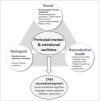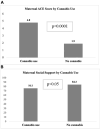Potentially modifiable risk and protective factors affecting mental and emotional wellness in pregnancy
- PMID: 38445095
- PMCID: PMC10912531
- DOI: 10.3389/fnhum.2024.1323297
Potentially modifiable risk and protective factors affecting mental and emotional wellness in pregnancy
Abstract
Introduction: Impaired mental and emotional wellness often co-occurs with prenatal substance use, and both affect infant socio-emotional, cognitive, language, motor, and adaptive behavioral outcomes. Guided by the modified biopsychosocial framework, this study examined the role of common substance exposures during pregnancy (i.e., alcohol and cannabis), socio-cultural factors (social support during pregnancy, adverse childhood experiences), and reproductive health factors on maternal mental health (MMH).
Methods: Data were obtained from a prospective cohort study-Ethanol, Neurodevelopment, Infant, and Child Health (ENRICH-2), and included 202 pregnant persons. Alcohol and cannabis exposures were assessed through repeated prospective interviews and a comprehensive battery of drug and ethanol biomarkers. MMH outcomes were evaluated during the third trimester through the Perceived Stress Scale, Edinburgh Depression Scale, Generalized Anxiety Disorders-7, and Post-traumatic Stress Disorder Checklist for Diagnostic and Statistical Manual of Mental Disorders. Univariate and multivariable linear regression models evaluated significant predictors of MMH.
Results: Results of multivariable analysis indicate that both maternal adverse childhood experiences and alcohol exposure, even at low-to-moderate levels, during pregnancy were associated with poorer scores for most MMH measures, while higher level of social support and Spanish as the primary language at home (as a proxy of enculturation) had protective effects (all p's < 0.05).
Conclusion: These findings highlight the importance of assessing substance use, including periconceptional alcohol exposure, and mental health in pregnant persons as closely related risk factors which cannot be addressed in isolation. Our findings also emphasize a strong protective effect of socio-cultural factors on maternal mental and emotional wellbeing-a strong precursor to maternal-infant bonding and infant neurodevelopment.
Keywords: alcohol; cannabis; mental health; pregnancy; social support; substance use.
Copyright © 2024 Wohrer, Ngo, DiDomenico, Ma, Roberts and Bakhireva.
Conflict of interest statement
The authors declare that the research was conducted in the absence of any commercial or financial relationships that could be construed as a potential conflict of interest.
Figures
References
Grants and funding
LinkOut - more resources
Full Text Sources
Research Materials
Miscellaneous



